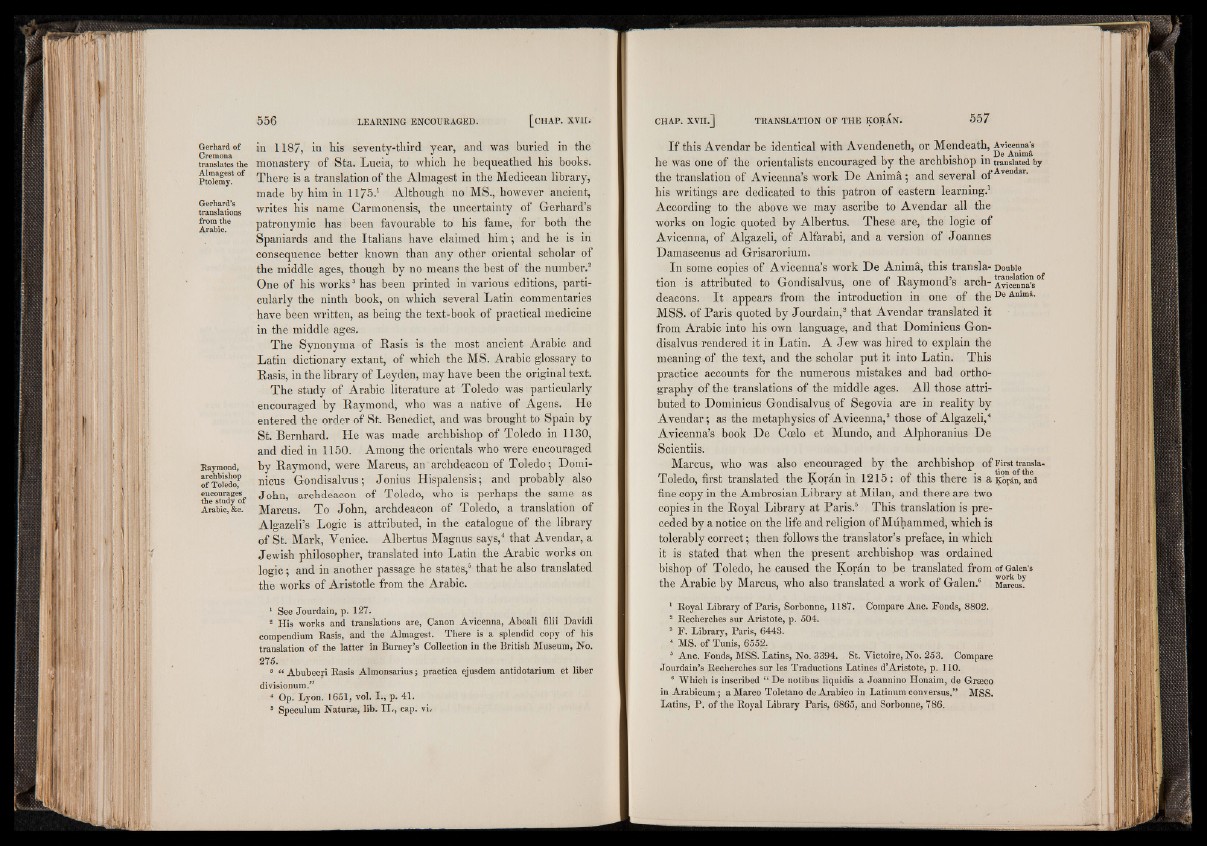
Gerhard of
Cremona
translates the
Almagest of
Ptolemy.
Gerhard’s
translations
from the
Arabic.
Raymond,
archbishop
of Toledo,
encourages
the study of
Arabic, &c.
in 1187, in his seventy-third year, and was buried in the
monastery of Sta. Lucia, to which he bequeathed his books.
There is a translation of the Almagest in the Medicean library,
made by him in 1175.1 Although no MS., however ancient,
writes his name Carmonensis, the uncertainty of Gerhard’s
patronymic has been favourable to his fame, for both the
Spaniards and the Italians have claimed him; and he is in
consequence better known than any other oriental scholar of
the middle ages, though by no means the best of the number.2
One of his works3 has been printed in various editions, particularly
the ninth book, on which several Latin commentaries
have been written, as being the text-book of practical medicine
in the middle ages.
The Synonyma of Rasis is the most ancient Arabic and
Latin dictionary extant, of which the MS. Arabic glossary to
Rasis, in the library of Leyden, may have been the original text.
The study of Arabic literature at Toledo was particularly
encouraged by Raymond, who was a native of Agens. He
entered the order of St. Benedict, and was brought to Spain by
St. Bernhard. He was made archbishop of Toledo in 1130,
and died in 1150. Among the orientals who were encouraged
by Raymond, were Marcus, an archdeacon of Toledo; Domi-
nicus Gondisalvus; Jonius Hispalensis; and probably also
John, archdeacon of Toledo, who is perhaps the same as
Marcus. To John, archdeacon of Toledo, a translation of
Algazeli’s Logic is attributed, in the catalogue of the library
of St. Mark, Yenice. Albertus Magnus says,4 that Avendar, a
Jewish philosopher, translated into Latin the Arabic works on
logic; and in another passage he states,5 that he also translated
the works of Aristotle from the Arabic.
1 See Jourdain, p. 127.
3 His works and translations are, Canon Avicenna, Aboali filii Davidi
compendium Basis, and the Almagest. There is a splendid copy of his
translation of the latter in Burney’s Collection in the British Museum, No.
275.
3 “ Abubecri Basis Almonsarius; practica ejusdem antidotarium et liber
divisionum.”
* Op. Lyon. 1651, vol. I ., p. 41.
5 Speculum Naturae, lib. I I ., cap. vi.
I f this Avendar be identical with Avendeneth, or Mendeath, Avicenna s
. . i i i i i • i • De Amma he was one of the orientalists encouraged by the archbishop in translated by
the translation of Avicenna’s work De Anima; and several of Avendar'
his writings are dedicated to this patron of eastern learning.1
According to the above we may ascribe to Avendar all the
works on logic quoted by Albertus. These are, the logic of
Avicenna, of Algazeli, of Alfarabi, and a version of Joannes
Damaseenus ad Grisarorium.
In some copies of Avicenna’s work De Anima, this transla- Double
tion is attributed to Gondisalvus, one of Raymond’s arch- a Vienna’s0
deacons. It appears from the introduction in one of theDeAmma-
MSS. of Paris quoted by Jourdain,2 that Avendar translated it
from Arabic into his own language, and that Dominicus Gondisalvus
rendered it in Latin. A Jew was hired to explain the
meaning of the text, and the scholar put it into Latin. This
practice accounts for the numerous mistakes and bad orthography
of the translations of the middle ages. All those attributed
to Dominicus Gondisalvus^ of Segovia are in reality by
Avendar; as the metaphysics of Avicenna,3 those of Algazeli,4
Avicenna’s book De Ccelo et Mundo, and Alphoranius De
Scientiis.
Marcus, who was also encouraged by the archbishop of First transia-
Toledo, first translated the Koran in 1215: of this there is a Koran, and
fine copy in the Ambrosian Library at Milan, and there are two
copies in the Royal Library at Paris.5 This translation is preceded
by a notice on the life and religion of Muhammed, which is
tolerably correct; then follows the translator’s preface, in which
it is stated that when the present archbishop was ordained
bishop of Toledo, he caused the Koran to .be translated from of Galen's
the Arabic by Marcus, who also translated a work of Galen.6 Marcusf
1 Boyal Library of Paris, Sorbonne, 1187. Compare Anc. Fonds, 8802.
3 Becherches sur Aristote, p. 504.
3 F . Library, Paris, 6443.
* MS. of Tunis, 6552.
3 Anc. Fonds, MSS. Latins, No. 3394. St. Yictoire, No. 253. Compare
Jourdain’s Becherches sur les Traductions Latines d’Aristote, p. 110.
3 Which is inscribed “ De notibus liquidis a Joannino Honaim, de Graeco
in Arabicum; a Marco Toletano de Arabico in Latinum conversus.” MSS.
Latins, P . of the Boyal Library Paris, 6865, and Sorbonne, 786.